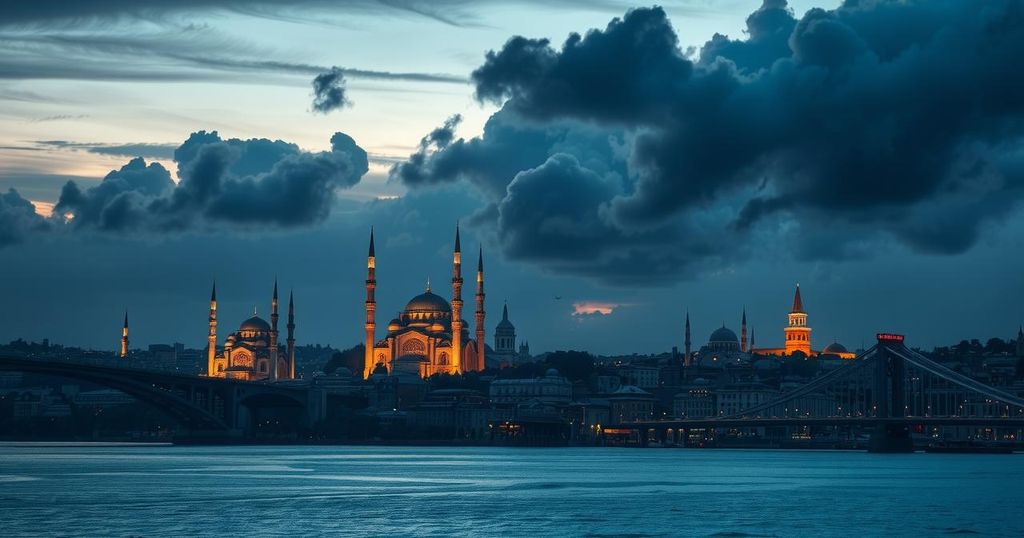Istanbul Talks Reinforce Turkiye’s Diplomatic Balancing Act Between Russia and Ukraine

Istanbul talks illustrate Turkiye’s balancing act between Russia and Ukraine. Despite Putin’s absence, delegations met to discuss a prisoner swap, marking significant talks since the war began in 2022. Turkiye is enhancing its influence in regional conflicts while managing its diplomatic relationships, reflecting its status as a critical negotiator. The recent disbanding of the PKK also strengthens its domestic position.
Recent talks in Istanbul underscored Turkiye’s deft balancing act between Russia and Ukraine since the latter’s invasion of Ukraine in 2022. Originally, there were high hopes for a direct meeting between Russian President Vladimir Putin and his Ukrainian counterpart Volodymyr Zelenskyy during these talks. However, the anticipation fell short as Putin announced he would not attend. Despite his absence, both nations sent delegations, agreeing to a prisoner swap, marking the first substantial discussions since the beginning of the war.
Turkiye’s role in facilitating these discussions reinforces its significant position in this ongoing geopolitical conflict. In 2022, the country hosted earlier negotiations, further illustrating its commitment to finding a resolution. The talks in Istanbul signify a continuation of this trend as Turkiye aims to influence the evolving situation in a favorable direction. Analyst Ziya Meral from RUSI remarked that Turkiye’s diplomatic involvement presents a victory, fulfilling its aim of being a key player in this critical matter.
In addition to recent diplomatic efforts, Turkiye has been taking steps to expand its sway in Syria as recent U.S. sanctions on Turkish-aligned groups were lifted. On the home front, the Kurdistan Workers’ Party (PKK) disbanding this week ends a 40-year conflict with Ankara — an encouraging sign for the Turkish government and an indication of shifting dynamics. Despite Putin and Zelenskyy not meeting face-to-face, analysts noted that Turkiye’s central role in diplomacy is a significant achievement in itself.
Omer Ozkizilcik, a fellow at The Atlantic Council, pointed out that Turkiye has led a peace process independent of U.S. involvement since the invasion. Their effort led to the Istanbul protocols, establishing a new model of negotiation where a nation with vested interests directs mediation efforts. Ozkizilcik claims this model allows Turkiye to view itself as a reliable negotiator in regional conflicts despite its own geopolitical interests.
Turkiye’s intricate balancing act in navigating relationships with both Russia and Ukraine has not been without challenges. On one hand, it opposes Russian expansionism in the Black Sea but on the other, it has had to manage its relations considering Russia’s various regional involvements. Notably, Ankara recognized the invasion as a war early on, allowing it to impose restrictions on Russian naval movements.
Turkey’s relations with Russia have experienced ups and downs over the years. The critical incident occurred in 2015 when Turkiye shot down a Russian fighter jet, leading to a significant rift in relations. However, a statement of regret from Turkiye allowed for a gradual rebuilding of ties. Though concerns persist, including Turkiye providing military support to Ukraine, both sides have seemed to compartmentalize their disputes.
On the friendship front with Ukraine, Turkiye has proven supportive, especially concerning military assistance and facilitating vital grain exports. Zelenskyy has often expressed gratitude for Turkiye’s efforts, acknowledging Erdogan’s leadership and diplomatic roles. During the talks, he emphasized the respect for Erdogan, even in Putin’s absence. This respect seems to enhance Turkiye’s standing and permits it room to engage with Russia more closely.
As the ongoing discussions unfold, experts like Steven Horrell posit that hosting successful negotiations would elevate Turkiye’s international standing. Turkiye seeks not just regional leadership but a prominent role on the global stage. By helping to drive peace efforts, Turkiye stands to gain in both its relationships with Russia and Ukraine, while fulfilling its own geopolitical aims. As the complexity of these relations continue to evolve, all eyes remain on Turkiye’s next steps in the region.
In summary, the talks in Istanbul signal Turkiye’s strategic balancing act amidst the ongoing conflict between Russia and Ukraine. Despite the absence of key leaders, Turkiye’s role as a mediator highlights its growing influence in international diplomacy. Analysts suggest that the country is successfully redefining itself as a pivotal diplomatic player, navigating complex relationships while pursuing its own geopolitical goals. The developments emphasize the importance of dialogue in seeking resolutions in global conflicts, placing Turkiye in a favorable position as discussions progress.
Original Source: www.aljazeera.com








